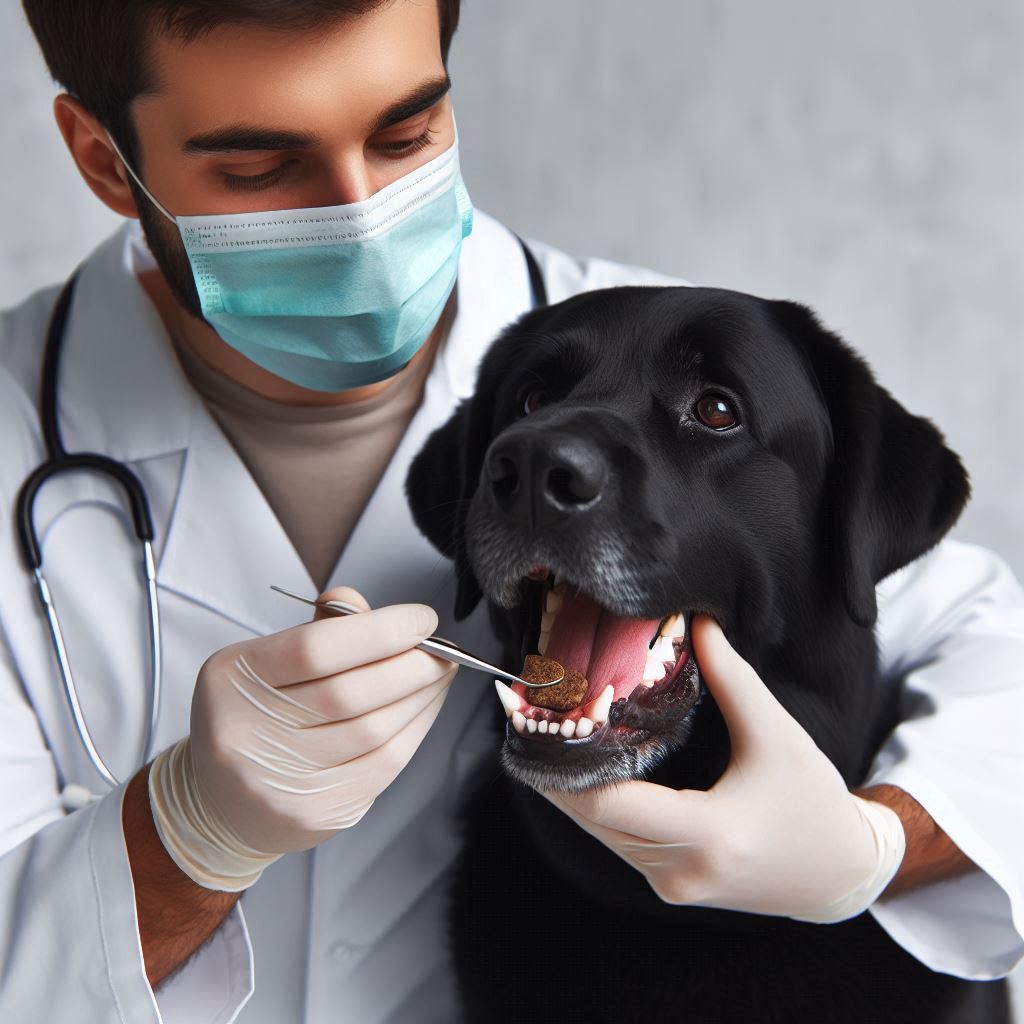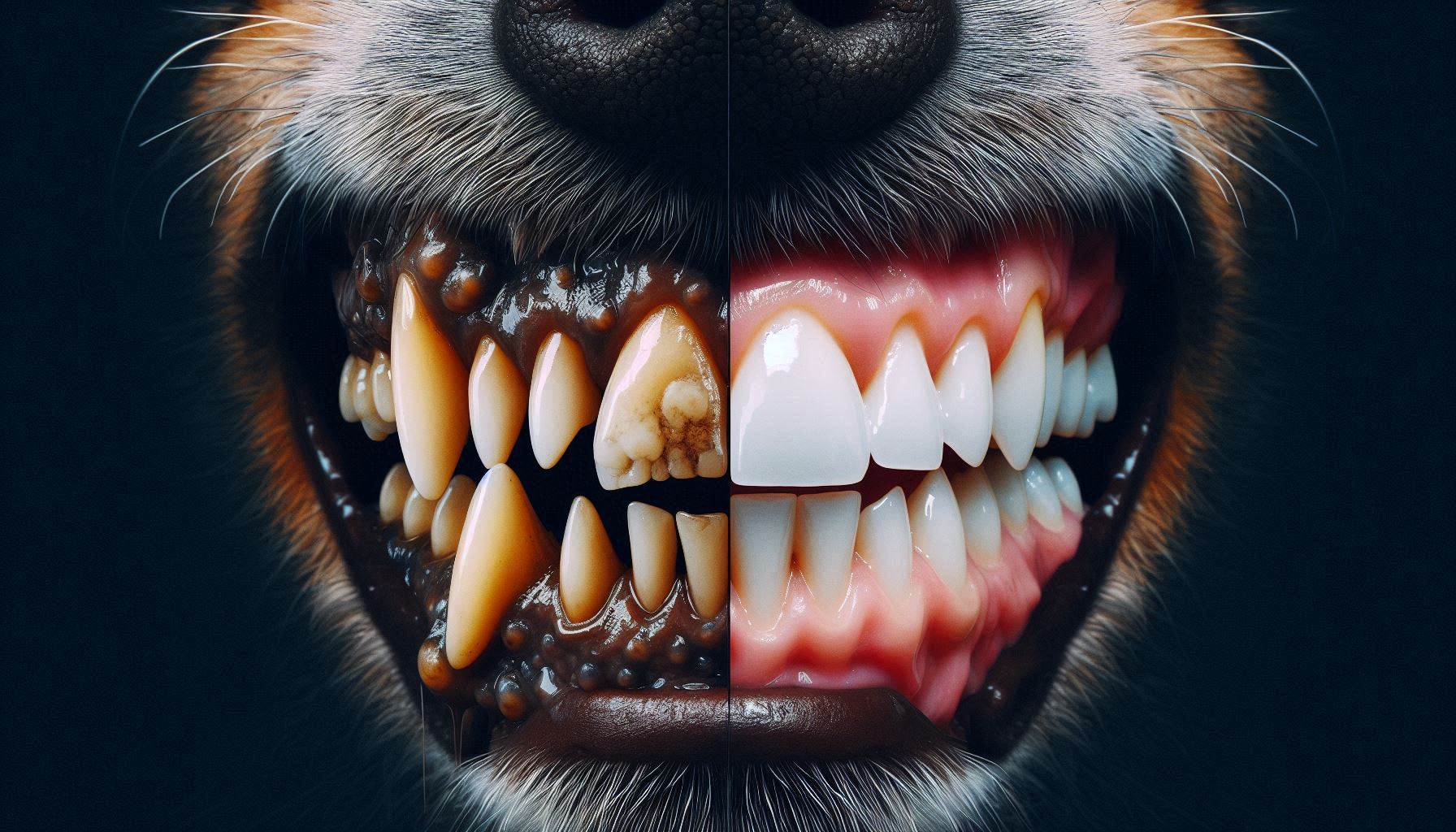When you consider your dog’s dental health, you might overlook the role dental chews play in keeping their teeth clean. These chews work through a combination of mechanical scrubbing and chemical action that helps remove plaque and food particles as your dog chews. But it’s not just about the chewing; the ingredients in these products can enhance their effectiveness considerably. Understanding how these components interact can inform your choices for your pet’s oral care routine, leading you to question what you really know about those dental chews and how to clean your dog’s teeth effectively.
Key Takeaways
- Dental chews utilize mechanical action from chewing to scrape away plaque and tartar from teeth surfaces.
- The unique textures of dental chews create an abrasive surface, effectively dislodging food particles and debris.
- Chewing stimulates saliva production, which helps break down plaque and wash away oral bacteria.
- Some dental chews contain antibacterial agents that enhance their effectiveness in promoting oral health.
- Regular use of dental chews, combined with proper care, significantly reduces the risk of dental disease in dogs.
How Dental Chews Work

Dental chews for dogs are specifically designed to support oral health by mechanically reducing plaque and tartar buildup as your dog chews on them. These chews often feature unique texture variations that create an abrasive surface, effectively scrubbing away debris and bacteria from your dog’s teeth.
When your dog bites down, the chew’s design allows for ideal contact with the tooth surface, promoting a cleaner mouth.
Moreover, flavor preferences play an important role in ensuring your dog enjoys these chews, making them more likely to engage with them regularly. Many dental chews come in flavors like chicken, beef, or peanut butter, appealing to your dog’s palate while providing dental benefits.
The combination of appealing flavors and varied textures encourages consistent chewing, which is essential for maximizing their effectiveness.
Scientific studies indicate that regular use of dental chews can lead to significant reductions in plaque and tartar levels. By incorporating these chews into your dog’s routine, you’re not just addressing the mechanical action of cleaning but also improving your understanding of how to clean your dog’s teeth in a more comprehensive way.giving them a treat; you’re actively supporting their dental health and contributing to their overall well-being.
Importance of Oral Hygiene
Maintaining your dog’s oral hygiene is essential for preventing dental disease, which can lead to pain and serious health issues.
Regular care, including the use of dental chews, can also help freshen your dog’s breath naturally, enhancing their overall well-being.
Preventing Dental Disease
Oral hygiene plays an essential role in preventing dental disease in dogs, directly impacting their overall health and well-being. Just like humans, dogs can develop periodontal disease, which affects their gums and teeth. This condition can lead to pain, tooth loss, and even infections that can spread to critical organs if left untreated. Consequently, prioritizing canine oral health is imperative.
Regular dental care, including professional cleanings and at-home maintenance, is key to effective dental disease prevention. Brushing your dog’s teeth several times a week, along with providing dental chews, can greatly reduce plaque buildup and tartar formation. These chews often contain ingredients that promote oral health, mechanically cleaning teeth as your dog chews.
Moreover, monitoring your dog’s oral hygiene can help you catch early signs of dental issues. Bad breath, swollen gums, or changes in eating habits may indicate underlying problems.
Freshening Breath Naturally
Freshening your dog’s breath naturally is an essential part of ensuring their overall oral health. Bad breath often signals underlying dental issues, such as plaque buildup or gum disease. Thankfully, you can address this concern using natural ingredients found in certain dental chews and breath fresheners specifically designed for dogs.
Look for products containing ingredients like parsley, mint, or coconut oil, which have been shown to neutralize odors and promote oral hygiene. These natural breath fresheners work by reducing bacteria in the mouth, alleviating halitosis while supporting gum health.
Additionally, incorporating crunchy vegetables, such as carrots or apples, into your dog’s diet can help mechanically remove plaque as they chew. Chewing can stimulate saliva production, further aiding in the natural cleaning process and providing a fresh scent.
Regular oral care, including dental chews, not only combats bad breath but also promotes overall dental health. By choosing products rich in natural ingredients, you can effectively freshen your dog’s breath while ensuring they receive the benefits of good oral hygiene.
Common Ingredients in Dental Chews

While choosing dental chews for your dog, it’s essential to understand the common ingredients that contribute to their effectiveness. Many dental chews include natural flavors, which not only enhance palatability but also encourage your dog to chew longer. Ingredients like chicken or beef liver are often used to make these products appealing, ensuring your dog enjoys the experience while benefiting from dental care.
Texture variations play a significant role in the cleaning action of dental chews. Chews with firm, rough surfaces can help scrub away plaque and tartar as your dog gnaws on them. Some brands incorporate abrasive materials, like silica or baking soda, that further contribute to this cleaning effect.
Additionally, some dental chews include beneficial ingredients, such as enzymes or probiotics, designed to promote oral health. These components can help break down food particles and combat harmful bacteria in your dog’s mouth.
Understanding these ingredients allows you to make informed choices when selecting dental chews, ensuring they’re both enjoyable and effective for your dog’s dental hygiene.
Always consult your veterinarian if you’re unsure about specific ingredients or their benefits.
Mechanisms for Plaque Removal
Dental chews utilize several effective mechanisms for plaque removal, vital for maintaining your dog’s oral health. One of the primary ways these chews work is through mechanical action. As your dog chews, the textured surface of the dental chew scrapes against their teeth, dislodging food particles and disrupting plaque formation. This action mimics the natural process of chewing on bones or fibrous materials, which has been shown to contribute to cleaner teeth.
Additionally, saliva interaction plays an important role in this process. Chewing stimulates saliva production, which contains enzymes and antimicrobial properties. These components help break down plaque and neutralize harmful bacteria in your dog’s mouth.
Furthermore, increased saliva flow aids in washing away food debris, further reducing the likelihood of plaque buildup.
Some dental chews are also formulated with specific ingredients that promote oral health. These may include natural abrasives or antibacterial agents that enhance the plaque-fighting capabilities of the chew.
Benefits Beyond Dental Health
Beyond their primary function of promoting oral hygiene, dental chews offer a range of benefits that can enhance your dog’s overall well-being. One significant advantage is their nutritional value. Many dental chews are formulated with added vitamins and minerals, contributing to your dog’s daily nutrient intake. This can support various physiological functions, from immune health to skin and coat condition.
Additionally, dental chews provide behavioral enrichment. Chewing is a natural behavior for dogs, and engaging in this activity can help alleviate boredom and reduce anxiety. By offering a satisfying chew, you encourage mental stimulation and promote a sense of calm. Research indicates that providing such enrichment can lead to lower stress levels and a decrease in destructive behaviors.
Moreover, the act of chewing itself can serve as a form of exercise for your dog’s jaw muscles, contributing to overall physical health. By regularly incorporating dental chews into your dog’s routine, you’re not just supporting dental health—you’re also fostering a well-rounded approach to their physical and mental well-being.
Fundamentally, these chews are a multifaceted tool for enhancing your dog’s quality of life.
Choosing the Right Dental Chew

Choosing the right dental chew for your dog involves careful evaluation of various factors to assure best benefits. Selecting a chew that suits your dog’s individual needs guarantees effective dental care and enhances their overall experience.
Here are four key factors to take into account:
- Flavor Preferences: Dogs often have specific taste preferences. Opting for a dental chew that aligns with their favorite flavors can increase engagement and promote regular chewing, enhancing its effectiveness.
- Chew Size: Size matters when it comes to dental chews. A chew that’s too small can pose a choking hazard, while one that’s too large may deter your dog from chewing. Always choose a size appropriate for your dog’s breed and size.
- Texture: The texture of the chew can influence cleaning efficacy. Look for chews designed with ridges or nubs that can help scrub plaque and tartar from teeth.
- Ingredients: Pay attention to the ingredients list. Opt for chews made with natural, digestible ingredients to support your dog’s health and avoid artificial additives.
Recommended Chewing Time
When it comes to dental chews, the ideal chewing duration and frequency are essential for maximizing their benefits.
Generally, you should aim for about 10 to 15 minutes of chewing time several times a week, depending on your dog’s age and chewing habits.
Understanding these factors can help you tailor a routine that supports your dog’s dental health effectively.
Optimal Chewing Duration
Finding the right chewing duration for your dog can greatly impact their dental health and overall enjoyment of dental chews. The ideal chewing time varies depending on your dog’s size, chewing techniques, and the chews’ textures. Generally, allowing your dog to chew for about 10 to 15 minutes per session can maximize benefits without causing fatigue or frustration.
Here are four key considerations for determining ideal chewing duration:
- Chewing Techniques: Observe how your dog chews. Some dogs are aggressive chewers, while others are gentle. Tailor the duration to their style to prevent dental damage or choking hazards.
- Ideal Textures: Select dental chews with textures that promote effective cleaning. Softer textures might require longer durations to achieve the desired results, while harder chews may be effective in shorter bursts.
- Size of the Chew: Confirm the chew is appropriate for your dog’s size. A larger chew may require more time to consume safely.
- Dog’s Age and Health: Older dogs or those with dental issues may need shorter sessions to avoid discomfort.
Frequency of Chewing
Establishing a regular frequency for your dog’s chewing sessions can greatly enhance the benefits of dental chews. Research indicates that consistent chewing not only aids in plaque and tartar reduction but also improves overall oral health. For ideal results, aim for a chewing frequency of at least two to three times per week. This schedule allows your dog to maintain a clean mouth while providing adequate time for the dental chews to be effective.
When it comes to chew duration, each session should last around 10 to 15 minutes. This duration is sufficient for the chews to work their magic without overdoing it, which can lead to digestive issues or oral fatigue. Monitoring your dog during chewing sessions is important; you want to make certain they’re chewing effectively rather than just swallowing the chews whole.
It’s also important to select dental chews that are appropriate for your dog’s size and chewing habits. By establishing a consistent routine with the right products, you can maximize the oral health benefits of dental chews and contribute to your dog’s well-being.
Age Considerations for Chewing
As your dog ages, their chewing needs and capabilities evolve, making it essential to adjust their dental chew routine accordingly. Understanding these changes can help you maintain peak dental health throughout your dog’s life stages, from puppy development to senior needs.
- Puppies (up to 1 year): During this phase, your puppy’s teeth are developing. Choose softer dental chews to promote safe chewing and alleviate teething discomfort.
- Young Adults (1 to 6 years): At this stage, your dog can handle firmer dental chews. These promote oral health by effectively reducing plaque and tartar buildup.
- Mature Dogs (6 to 10 years): As your dog ages, consider chews with added nutritional benefits that support joint health, as well as softer options that are gentle on their teeth and gums.
- Seniors (10+ years): Senior dogs often have sensitive teeth or gum issues. Opt for soft, easily digestible chews that focus on dental health without compromising their well-being.
Monitoring Your Dog’s Dental Health

Monitoring your dog’s dental health is crucial for guaranteeing their overall well-being. Regular dental check-ups are essential for identifying potential issues before they escalate. During these visits, your veterinarian will assess your dog’s teeth and gums, looking for early signs of dental disease such as plaque buildup, gingivitis, or tooth decay.
You can help monitor your dog’s dental health at home by conducting routine inspections of their mouth. Look for signs of discomfort, such as difficulty eating, excessive drooling, or bad breath. These could indicate underlying dental problems.
Additionally, you should check for inflamed gums or loose teeth, which may require immediate veterinary attention.
Incorporating dental chews into your dog’s routine can also aid in maintaining oral health. These chews can help reduce plaque and tartar buildup, complementing your regular dental care efforts.
Conclusion
In the grand symphony of your dog’s health, dental chews play a crucial note, harmonizing mechanical scrubbing with chemical action to keep teeth sparkling and gums healthy. By choosing the right chew and monitoring your pup’s dental health, you’re not just preventing plaque; you’re crafting a brighter future for their smile. So, let those chews be the brush that sweeps away the shadows of dental decay, ensuring your furry friend’s grin shines like a beacon of wellness.








